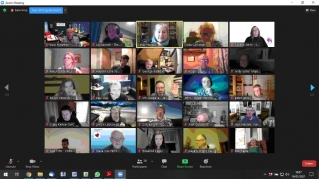The shibboleth in barbershop circles is that any attempt at comedy has, first and foremost, to be sung well if it is to work. The better it’s sung, the funnier people will find it. This post unpicks this assumption: there’s something to it for sure, but I don’t think it tells the whole story.
The reason why this generalisation seems generally plausible is, I think, because ‘well sung’ functions as an effective proxy for ‘thoroughly-rehearsed’ and ‘has high standards’. Ensembles that develop their skills in one of these dimensions typically improve in the others too. Lurking behind the truism is the memory of mediocre performances that were not very well executed as comedy, didn’t have enough jokes in them (those they did have being rather obvious), and that were also not very well sung.
But this is a case of correlation, rather than causation. It’s not necessarily the fact that they’re singing better that makes a successful group more funny. In fact, these two dimensions are at least moderately dissociable once you’re beyond the base level of ‘does the audience trust your skillset?’


